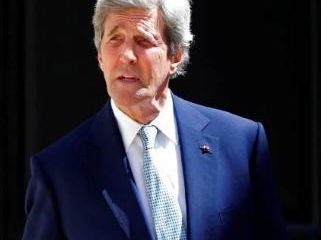World
UN chief outraged by destruction of Iraq’s cultural heritage

United Nations: UN Secretary-General Ban Ki-moon has said that he “is outraged by the continuing destruction of cultural heritage in Iraq” by the Islamic State (IS), and urgently called on the “international community to swiftly put a stop to such heinous terrorist activity”.
The secretary-general is outraged by the continued destruction of cultural heritage in Iraq by the IS amid reports of the razing of the ancient city of Hatra, a Unesco World Heritage Site in the north of the country, Ban’s spokesman said a statement issued here on Sunday night, a news agency reported.
“The secretary-general reiterates that the deliberate destruction of our common cultural heritage constitutes a war crime and that the perpetrators must be held to account,” the statement said.
“The secretary-general urgently calls on the international community to swiftly put a stop to such heinous terrorist activity and to counter the illicit traffic in cultural artifacts,” as demanded by relevant UN Security Council resolutions, the statement said.
The Unesco also condemned the destruction of the ancient city and said that it showed the “contempt” that the IS has for the history and heritage of the Arab people.
IS militants, who control large areas of Iraq and Syria, have destroyed ruins at the ancient city of Hatra and the extent of the damage remained unclear, reports said.
Hatra was set up in the days of the Parthian empire more than 2,000 years ago.
The militants recently bulldozed ruins at the Assyrian city of Nimrud and destroyed museum artefacts in Mosul in north Iraq as IS describes shrines and statues as “false idols” that have to be smashed.
The UN Security Council has adopted relevant resolutions to call for strengthened international efforts to fight the IS.
Iraq is facing an insurgency by the IS Sunni radical group, which has forced thousands of people mainly from minority communities to flee their homes.
The group, whose fighters had seized vast swathes of territory in northern Iraq since June 2014 and announced the establishment of a “caliphate” in areas under its control in Syria and Iraq, has released videos showing the beheadings of at least two American journalists and a British aid worker.
World
Lockdowns in China Force Urban Communities to Defy Censorship and Vent Frustration Online

Shanghai’s rich middle class is leading a wave of online dissent over the strict and prolonged lockdowns imposed in various parts of the country. Chinese internet censorship is struggling as patience is wearing thin in many urban centers, coming up with creative forms of online protests.
Social Media Posts Revealing Lockdown Tension in Shanghai
Drawn-out lockdowns are nothing new in China as authorities insist with the nation’s zero-Covid policy since the start of the pandemic. Currently over This time around, however, metropolitan areas like Shanghai are increasingly difficult to keep quiet, given that its more than 25 million residents have seen weeks of total isolation along with food shortages and many other service interruptions.
Dozens of towns and reportedly over 300 million Chinese citizens have been affected by lockdowns of different severity. As expected, urban netizens have been most outspoken over their difficulties by finding creative ways to get around state censorship and bans placed on topics, news comments and spontaneous campaigns.
Shanghai residents have been using mobile proxies and hijacking seemingly unrelated hashtags to talk about healthcare issues, delivery failures and the overall severity of their situation. The “positive energy” that the Chinese government wants to transmit during the recent prolonged series of lockdowns does not come naturally to those counting food supplies and online censors are working hard to filter words, trending topics and undesired social media sharing.
WeChat groups and message threads are under constant monitoring. Posts questioning the zero-Covid approach have been quickly deleted, including by leading Chinese health experts like Dr. Zhong Nanshan. Video footage is soon censored and protests and investigations are quickly made to disappear.
Where this has not worked, officials have exposed banners with warnings and outright threats like “watch your own mouth or face punishment”, while drones have been patrolling the city skies. Yet, if anything, this has led to further tensions and unspoken confrontation with Shanghai’s educated and affluent middle class.
Creative Online Solutions Harnessing Civic Energy
Announcements by Chinese social media that they would be publishing the IP addresses of users who “spread rumors” have not helped either. Tech industry research has shown that much of Asia’s tech-savvy population has a habit of using mobile proxies and other privacy tools, quickly finding workarounds to browse the internet freely and talk to the world about the hottest topics.
The sheer volume of forbidden posts is already a challenge for the very censorship system, experts explain. Unable to track all trending hashtags, state workers overlook topics that speak about the US, Ukraine or other popular news. Linking human rights elsewhere to their situation, Chinese online dissidents establish their informal channels and “hijack” the conversation to share personal or publicly relevant information about the Covid suppression in their town.
Sarcastic and satirical posts still dominate. Others hope to evade the censors by replacing words from famous poems or the national anthem. One thing is certain – social media, when harnessed with the right creativity, has proven its ability to mount pressure on the government in even some of the most strictly controlled tech environments like China.























